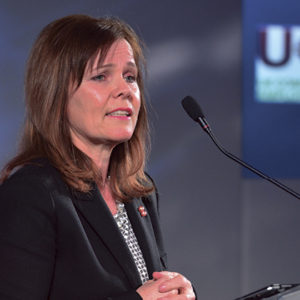Middle leaders in schools could be trained to deliver careers advice through a proposed new apprenticeship.
The teacher training charity Teach First has called for an “apprenticeship qualification” to give every school “a trained careers middle leader”.
The role would involve developing and leading a “whole school strategy for careers and employability”, and the proposal is backed by the Careers and Enterprise Company and teaching union ATL.
We are calling for a trained middle leader in every school
But one teacher training expert has called instead for a strategy that gets all teachers in a school involved in careers education, rather than individual members of staff.
Teach First wants the training delivered as an apprenticeship, and funded through the apprenticeship levy.
At present, plans are sketchy, but a spokesperson for the charity said more information, including costings, will be released shortly.
“We know that many pupils from disadvantaged backgrounds are less likely to receive the same high-quality advice and guidance than their wealthier peers, which makes it harder for them to make informed decisions about their future,” she told Schools Week.
“That is why we are calling for a trained middle leader in every school, who understands their particular school’s needs.”
She insisted that apprenticeships would be a positive way to achieve this as “schools are already having to set aside apprenticeship money”, and “many highlight careers advice and guidance as an area they would like to improve”.

Claudia Harris, the chief executive of the government-funded Careers and Enterprise Company, backed the idea, and said her organisation’s work would be strengthened by a key point of contact or ‘careers leader’ in each school.
“The ‘careers leaders’ approach has received two positive initial impact assessments following pilots by Teach First and the Gatsby Foundation earlier this year,” she said.
A spokesperson for ATL told Schools Week that it would “love to be involved” in developing an apprenticeship standard focused on careers education, provided it was “good quality and appropriate”.
She said: “We definitely think there should be more careers leaders in schools, no doubt about it, it’s something we have been calling for and we can see how the apprenticeship levy could be used.”
Concerns about the quality of careers advice are ongoing.
Recent research by Deidre Hughes, the former chair of the National Careers Council, noted that major government reforms for expanding apprenticeships and new technical education routes highlighted the need for the “widespread availability of comprehensive career guidance”.
Currently, Hughes said, careers work in schools is “not reaching those most in need”.

But some feel a new careers apprenticeship may not be the solution.
Sir Andrew Carter, the South Farnham teaching school head who led the government’s review of initial teacher training, pointed out that simply adding more specialist teachers would not be enough, and every teacher should get involved.
“The problem with having career teachers is other people then think it’s not their job,” he said.
“The role models that we set for children in school, from the very early days, and the aspirations that we give them, that’s part of the role of a teacher, not just somebody who’s involved in careers teaching.”
He said careers should be made more prominent in the teaching apprenticeship standard that is already being developed, and argued that universities should be getting more involved.
“If we want more people to go to university, they themselves could be reaching out more,” he said. “It would be great if universities were sowing the seeds with five- and six-year-olds.
“I think it’s a bit simplistic to say that you’ll create career teachers and that will do it.”







Thirty years ago, under the Technical and Vocational Education Initiative (TVEI), I was trained as a careers teacher within area-wide TVEI related in-service training. Each careers teacher became responsible for the development of work-related education including careers education and guidance (CEG) in their school.
Careers education is more than encouraging pupils to be aspirational as Sir Andrew Carter says. It’s giving pupils the skills (I know, that’s a dirty word to some people) and the knowledge to make a decision wisely about their future prospects. Individual teachers have an important role to play but CEG becomes watered-down when left just to individual subject teachers.
The ‘apprenticeship’ model may go someway to redressing the poor quality of CEG but it needs to be in collaboration with properly-trained careers professionals.
The development of a career development professional higher apprenticeship has been granted by DfE to an employers forum as currently no standard (formerly known as a framework)exists. I have not heard from Teach First in response to the initial consultation but hopefully they, the ATL and the CEC will respond when the employers forum goes out for further consultation on the Standard again later in the year. In England an apprenticeship standard can only be developed by a forum of 10 or more employers (i.e not by the CEC or the ATL) unlike Scotland where it has be developed by the professional body – the Career Development Institute.